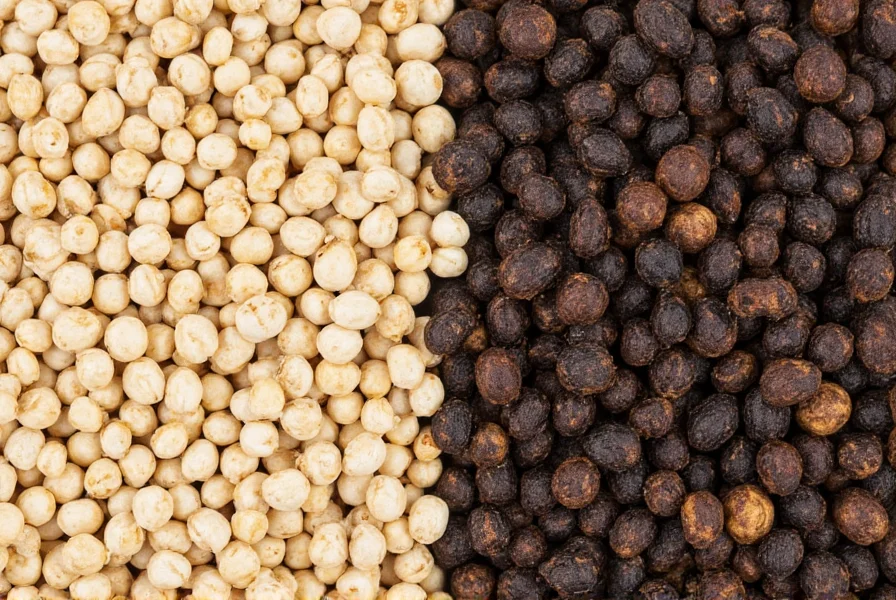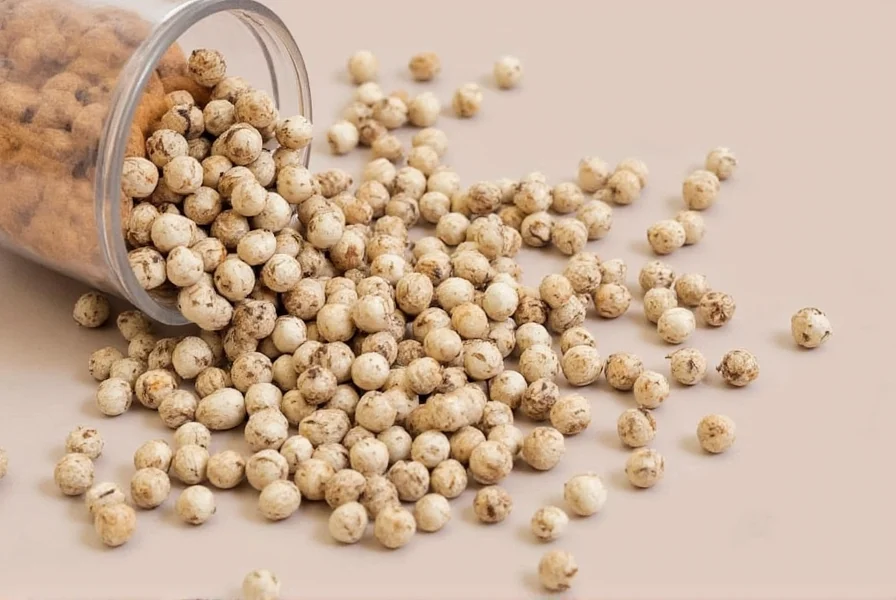Understanding the nuanced flavor profile of white pepper helps home cooks and professional chefs make informed seasoning decisions. Unlike its more common counterpart, white pepper undergoes a different processing technique that significantly alters its chemical composition and resulting taste experience.
The Distinctive Flavor Profile of White Pepper
White pepper's taste can best be described as earthy, musty, and slightly fermented, with subtle floral undertones. While black pepper delivers an immediate sharp heat, white pepper provides a more gradual warmth that builds slowly and lasts longer. This difference in white pepper flavor profile stems from the removal of the peppercorn's outer layer during processing.
The outer husk of black peppercorns contains most of the piperine—the compound responsible for pepper's characteristic heat. When this husk is removed to create white pepper, the resulting spice has approximately 30% less piperine, explaining its milder initial impact. However, white pepper develops more complex secondary flavors through the fermentation process required to remove the husk.

White Pepper vs Black Pepper: A Detailed Comparison
When evaluating white pepper vs black pepper taste, several key differences emerge that affect culinary applications:
| Characteristic | White Pepper | Black Pepper |
|---|---|---|
| Initial Heat | Milder, less sharp | Stronger, immediate bite |
| Flavor Complexity | Earthy, musty, floral notes | Citrusy, pine-like, woody notes |
| Heat Duration | Longer-lasting warmth | Shorter, more intense heat |
| Chemical Composition | Less piperine, more volatile oils | Higher piperine concentration |
| Best Culinary Uses | Light-colored sauces, mashed potatoes, Chinese cuisine | Most savory dishes, visible seasoning |
The Science Behind White Pepper's Unique Taste
The distinctive why does white pepper taste different question has a clear scientific explanation. White pepper comes from the same Piper nigrum plant as black pepper, but undergoes a different processing method. After harvesting, black peppercorns are dried with their outer layer intact, while white peppercorns have their outer layer removed through a process called retting.
During retting, harvested peppercorns are soaked in water for about a week, allowing natural enzymes to break down the outer layer. This fermentation process creates additional flavor compounds not present in black pepper, contributing to white pepper's characteristic earthy, slightly fermented notes. The resulting spice has a more homogeneous texture and dissolves more completely in liquids, making it preferable for certain culinary applications.
Culinary Applications Where White Pepper Shines
Chefs choose white pepper primarily for two reasons: visual appeal and specific flavor requirements. In light-colored dishes like béchamel sauce, mashed potatoes, or white fish preparations, black pepper flecks would be visually distracting. But beyond aesthetics, certain cuisines deliberately leverage white pepper's unique flavor profile.
Traditional Chinese cuisine frequently uses white pepper in soups and stir-fries where its milder heat and earthy notes complement other ingredients without overwhelming them. In European cooking, white pepper appears in classic dishes like coq au vin blanc and certain cheese sauces where its subtle warmth enhances rather than dominates.
Professional chefs note that is white pepper milder than black pepper is somewhat misleading—while white pepper has less initial heat, its warmth persists longer. This makes it particularly valuable in slow-cooked dishes where the flavor can develop gradually throughout the cooking process.
Common Misconceptions About White Pepper
Several myths persist about white pepper that affect how cooks use it. Many believe white pepper is simply "weaker" black pepper, but this oversimplifies the complex flavor differences. Others think white pepper is a different plant species, when in fact it comes from the same vine as black pepper.
Another common misconception is that white pepper lacks complexity. In reality, its flavor profile is different rather than inferior—featuring more earthy, musty notes with subtle floral undertones that black pepper doesn't possess. Understanding these distinctions helps cooks make more informed seasoning choices based on the specific requirements of each dish.
When to Choose White Pepper Over Black Pepper
Selecting between these pepper varieties depends on both visual and flavor considerations. Choose white pepper when:
- You're preparing light-colored dishes where black specks would be undesirable
- The recipe calls for a more gradual, lingering warmth rather than immediate heat
- You want to highlight earthy, floral notes rather than citrusy, pine-like flavors
- Preparing traditional Chinese or certain French dishes that specifically call for white pepper
- Creating smooth sauces or purees where texture consistency matters
For most other applications, black pepper remains the preferred choice due to its brighter, more complex top notes and immediate aromatic impact. Many professional kitchens keep both varieties on hand to address different culinary requirements.
Conclusion
Understanding what does white pepper taste like reveals a spice with a distinctive flavor profile that serves specific culinary purposes. Its milder initial heat, earthy complexity, and longer-lasting warmth make it valuable for particular dishes where black pepper would be visually or flavor-wise inappropriate. By recognizing these differences, cooks can make more informed seasoning decisions that enhance rather than detract from their culinary creations.
Why does white pepper taste different from black pepper?
White pepper tastes different because it's processed differently. The outer layer of the peppercorn is removed through fermentation, which reduces the piperine content (making it milder initially) while developing more earthy, musty flavor compounds through the retting process.
Is white pepper spicier than black pepper?
No, white pepper is generally less spicy upfront than black pepper due to lower piperine content, but its heat builds more gradually and lasts longer. Black pepper delivers an immediate sharp heat, while white pepper provides a more subtle, lingering warmth.
Can I substitute white pepper for black pepper in recipes?
You can substitute white pepper for black pepper, but the flavor profile will change. Use a 1:1 ratio, but understand that white pepper provides milder initial heat with more earthy notes. It works best in light-colored dishes where black pepper flecks would be undesirable.
Why do Chinese restaurants use white pepper?
Chinese cuisine traditionally uses white pepper because its milder, earthier flavor complements many dishes without overwhelming other ingredients. It's particularly common in soups, dumpling fillings, and certain stir-fries where its subtle warmth enhances rather than dominates the flavor profile.
Does white pepper lose its flavor over time?
Like all ground spices, white pepper gradually loses potency over time. Whole white peppercorns retain their flavor longer—up to 2-3 years when stored properly in an airtight container away from light and heat. Ground white pepper maintains optimal flavor for about 6 months.











 浙公网安备
33010002000092号
浙公网安备
33010002000092号 浙B2-20120091-4
浙B2-20120091-4